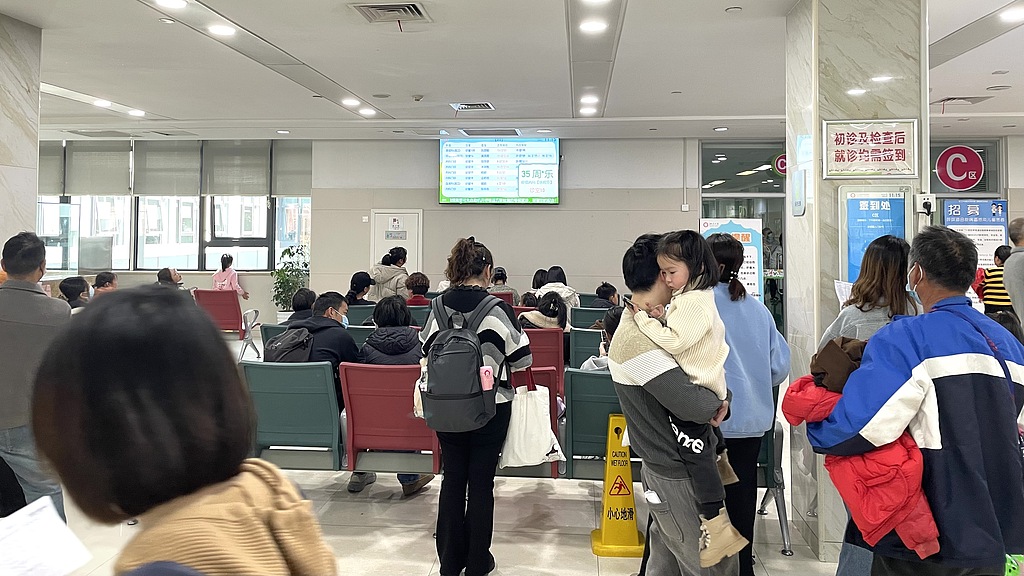China enhancing childcare services with eye on fertility rate


Soothing a crying baby during vaccinations is a challenge for many first-time parents, and the typically crowded, hectic hospital environment only heightens their stress.
To create a more welcoming atmosphere, a community health service center in Beijing has recently revamped its child vaccination unit with playful, vibrant decorations. Moreover, during the postvaccination observation period, the center offers families parent-child activities, scientific parenting guidance and postnatal care education.
Wen Chengyang, head of the childcare service management center of Beijing's Changping district, said that the change stems from a central finance-subsidized initiative that integrates community healthcare services with nursery care.
In China, a lack of accessible, high-quality nursery care services is seen as a key factor discouraging young couples from having children.
Amid declining birthrates, the nation has ramped up efforts to expand childcare services, aiming to increase care slots for children aged 3 and under to 4.5 per 1,000 people by the end of this year. That figure was 1.8 in 2020.
The Changping district's community health center recently opened its own nursery care facility, adding 60 new care slots.
"The monthly fee for a nursery care slot in the district has dropped from around 6,860 yuan ($957) last year to no more than 2,160 yuan now," said Wen. "This means each family with a newborn can save up to 56,400 yuan annually."
Guo Yanhong, deputy director of the National Health Commission, said on Friday that the number of nursery care slots has grown by over 20 percent annually for three consecutive years in China, with county-level childcare coverage reaching 98.5 percent.
"Affordable childcare services are becoming more accessible, convenient and of higher quality," she said during an event marking World Population Day on July 11.
"We will continue improving maternal and child healthcare, pediatric services and affordable childcare while addressing young people's key concerns in education, housing and employment," she added.
According to a recent guideline released by the commission and six other government departments, the nation's affordable nursery care system will be basically established by 2030, with supportive policies in place.
"Family childcare costs will be significantly reduced, and public demand for affordable services will be largely met," it said.
The guideline emphasizes that the national nursery care system will include comprehensive service centers and diverse providers, such as standard nursery units, home-based or community-based facilities, kindergartens offering childcare, and employer-supported centers. Medical institutions are also encouraged to assist childcare facilities.
Among them, comprehensive nursery care centers not only provide care slots but also offer staff training, parenting guidance and oversight. Central government funding has established 347 such centers nationwide.
Nadia Rasheed, the United Nations Population Fund's representative to China, said that after rapid population growth in the 20th century, global fertility rates — including China's — are hitting record lows.
"One in four people now live in a country where the population has already peaked. By the end of this century, our global population will begin to decline," she said.
She said that most people worldwide still desire two or more children, but economic pressures, inadequate social support and gender inequality hinder their ability to do so.
"The solution to this crisis of reproductive agency lies in removing barriers that stand in people's way and expanding their choices," she said. "It means making parenting accessible and affordable and formulating family-friendly policies."
She recommended measures such as affordable childcare, support for young adults in education, employment and housing, and promoting gender equity and shared parenting responsibilities.
- A collection of archives detailing the crimes of Japan's Unit 731 released
- 'Reservoirs of primordial water' may be buried deep within Earth
- China remembers victims of Nanjing Massacre, 88 years on
- China's Kuaizhou-11 Y8 rocket launches space experimental spacecraft into space
- Relic dates Jinan founding to around 4,200 years ago
- New rocket set to debut soon, launch six satellites




































